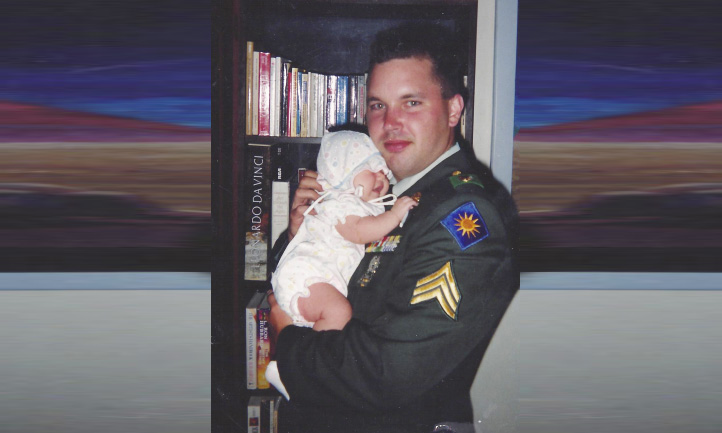Grief Reactivated
Author: Ashlynne Haycock-Lohmann
My father died almost 14 years ago of a heart attack while training to deploy. I was just 10 years old. I went through denial, anger and depression. Eventually, I came to accept the loss. After going through those steps, I thought it was over; I was finally done grieving.
Even though the process did not occur in any prescribed order or in the way some say it should have, I felt I reached important milestones in my grief journey. Just like other survivors, I still had moments around angelversaries, holidays and birthdays that were tough. But, for the most part, I felt that I had moved on- that my grief was gone. What I didn't understand was that it was just hibernating. It never goes away and occasionally it rears its ugly head. I learned that it is OK when this happens.

The husband of my mother's best friend, whom I love like an aunt, died. He was an Army veteran who died suddenly of a heart attack. He was not much older than my father had been when he died from a heart attack. In addition, he left behind a 12-year-old son, about the same age I was when my dad died. It felt as if the grief I buried so deep inside me ripped open again. I wanted nothing more than to support my aunt and cousin, but it was hard to be there when internally I was being torn apart. I have experienced other losses in my life since my dad's passing, but none triggered this visceral reaction from me.
It was like everything happening to my cousin was happening to me. When he had to tell his friends his dad had died, it was a flashback to when I had to do the same thing 14 years ago. When he had to bury his dad, it felt as though I was burying my dad all over again.
I thought I must be losing my mind because in no way could this be normal. That is until I was at an event with my TAPS colleagues and someone else mentioned having similar feelings. After much discussion, I learned there was a term for this feeling - grief reactivation. It is a type of secondary loss similar to what you feel on angelversaries, holidays and major milestones missed by your loved one.
Gaining this knowledge turned out to be a healing experience for me. It taught me even more about my grief and loss. Some of the most important things I learned from this experience are
- Grief doesn't end, because love never ends. I will never stop grieving my father because I will never stop loving him. He taught me to ride a bike, took me to cheer classes and held me when I cried. Even though I won't be able to create new memories with him that does not mean that my old ones will go away. Almost everything in my life could be taken from me, but my love for my father is something that cannot be changed.
- The concept of a timeline for grief is a lie. Even 14 years out, I still have days where I do nothing but lie in bed and cry. I also have days where I get up, go to work and function like a normal adult. Everyone grieves differently. There will be things in life that reactivate your sense of loss. It may become easier to find your new normal but your grief will never completely go away. That's OK.
- Reactivation is not a step backward-it's a step forward. When your grief reactivates, especially after several years of being in your new normal, it can be confusing. How can you possibly be going backward when you have made so many steps forward? The simple answer is you're not. The fact that you realize your grief has been reactivated is a huge step in the right direction because you know how to deal with it. Chances are the things you found helpful after your initial loss are going to be helpful now. For me, I find going to counseling, the gym and writing are the most helpful tools. Since I know these outlets helped me, I know I can count on them again to get through my reactivation.
- Remember that person who you could call in the middle of the night immediately after your initial loss? Chances are that person can be a good support for you during your reactivation. TAPS also has resources in place to offer care on those dark nights of loneliness. The TAPS National Military Survivor Helpline is answered 24/7 and is a great tool when you need someone to talk to or walk you through the next steps.
When reactivation feelings wash over you, it can leave you feeling raw-even gutted again, and this is all right. It may confuse people as to why you are suddenly back in the dark valley of when your loss first occurred. That is also all right. Grief is a personal journey with no prescribed timeline. Each one of us must find our way.
While reactivation may be confusing, it is a normal experience. Find ways to focus on your love of the deceased, not the death. Do things to honor them and that you think would make them proud. Remember to breathe in your daily quest to move forward. You have an amazing support system. Your TAPS family loves you and understands your loss. They are a phone call away for a listening ear or a virtual hug across the miles.
 By Ashlynne Haycock, surviving daughter of SFC Jeffrey Haycock and SRA Nichole Haycock: Ashlynne Haycock graduated from American University in 2013 with a bachelor’s degree in political science. Before joining the TAPS staff, she attended Good Grief Camp as a child for seven years and as a volunteer mentor for four years. She now serves as the Education Support Services Coordinator, helping survivors access education benefits.
By Ashlynne Haycock, surviving daughter of SFC Jeffrey Haycock and SRA Nichole Haycock: Ashlynne Haycock graduated from American University in 2013 with a bachelor’s degree in political science. Before joining the TAPS staff, she attended Good Grief Camp as a child for seven years and as a volunteer mentor for four years. She now serves as the Education Support Services Coordinator, helping survivors access education benefits.
